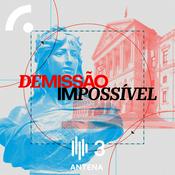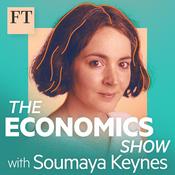266 episódios
- This is a free preview of the episode "Iran Pt. 2: The Impacts of Economic Strangulation w/ Elina Xenophontos." You can listen to the full episode by subscribing to our Patreon here: https://www.patreon.com/upstreampodcast
As a Patreon subscriber you'll get access to at least one bonus episode a month (usually two or three), our entire back catalog of Patreon episodes, early access to certain episodes, and other benefits like stickers and bumper stickers—depending on which tier you subscribe to. access to bi-weekly bonus episodes ranging from conversations to readings and more. Signing up for Patreon is a great way to make Upstream a weekly show, and it will also give you access to our entire back catalog of Patreon episodes along with stickers and bumper stickers at certain subscription tiers. You'll also be helping to keep Upstream sustainable and allowing us to keep this project going.
In Part 2 of our ongoing series on Iran, Elina Xenophontos joins us to discuss the history and impacts of sanctions on Iran—including the impacts on the current crisis in the country. Elina Xenophontos is an international law and economic globalisation specialist. She produces much of her own material on her Substack and is also featured regularly on the Colonial Outcasts podcast.
Our conversation begins with a very deep dive into the history of the sanctions imposed on Iran from the 1979 Islamic Revolution to the present, providing a detailed understanding of exactly how the sanctions have impacted the Islamic Republic's economic and political spheres for the past half decade. We then situate the unrest in Iran in the context of the sanctions, urging those in the West to understand what's happening in Iran from a dialectical and historical materialist analysis which understands Iranian agency and grievances as a direct result of imperialist strangulation.
Elina then gives us a 101 on the Islamic Republic's internal political forces and factions, outlining their tensions, dynamics, and ideological orientations. We then discuss Iran's political economy, discussing how the sanctions have shaped Iran's class dynamics and its society more broadly and how the sanctions are a barrier to working class organization and revolution in Iran because they engender a rentier economy not rooted in production but in survival and perpetual crisis.
Further resources:
Elina Xenophontos on Substack
Iran's Indigenous Labor Movement and Working Class Sovereignty
The harsh effects of sanctions on Iranian health," by Payman Salamatia
& Claudia Chaufanb (The Lancet)
Related episodes:
Listen to our ongoing series on Iran
Listen to our ongoing series on Venezuela
Listen to our ongoing series on China
Listen to our ongoing series on Mexico
US Labor & Imperialism Pt. 1: the War Against Communism w/ Jeff Schuhrke
Upstream is a labor of love—we couldn't keep this project going without the generosity of our listeners and fans. Subscribe to our Patreon at patreon.com/upstreampodcast or please consider chipping in a one-time or recurring donation at www.upstreampodcast.org/support
For more from Upstream, visit www.upstreampodcast.org and follow us on Instagram and Bluesky. You can also subscribe to us on Apple Podcasts, Spotify, or wherever you listen to your favorite podcasts. [TEASER] Venezuela Pt. 6: The Empire Strikes w/ José Luis Granados Ceja and Andreína Chávez
03/2/2026 | 27minThis is an unlocked version of the Patreon episode "Venezuela Pt. 6: The Empire Strikes w/ José Luis Granados Ceja Andreína Chávez." You can listen to our entire 5-part series on Venezuela by subscribing to our Patreon here: https://www.patreon.com/upstreampodcast
As a Patreon subscriber you'll get access to at least one bonus episode a month (usually two or three), our entire back catalog of Patreon episodes, early access to certain episodes, and other benefits like stickers and bumper stickers—depending on which tier you subscribe to. access to bi-weekly bonus episodes ranging from conversations to readings and more. Signing up for Patreon is a great way to make Upstream a weekly show, and it will also give you access to our entire back catalog of Patreon episodes along with stickers and bumper stickers at certain subscription tiers. You'll also be helping to keep Upstream sustainable and allowing us to keep this project going.
In Part 6 of our ongoing series on Venezuela, José Luis Granados Ceja and Andreína Chávez join us to discuss the aftermath of the abduction of Nicolás Maduro and Cilia Flores and the United States' attempted takeover of Venezuela. José Luis Granados Ceja is a journalist with Drop Site News based in Mexico City who has been covering Venezuela for 20 years. Andreína Chávez is a Venezuelan journalist based in Caracas.
Our conversation begins with an overview of the night of President Nicolás Maduro and his wife Cilia Flores's kidnapping, told by Andreína who was in Caracas at the time. We also get an update on Maduro and Flores's detention in the United States and the charges they are facing. We then explore the US's intentions behind the kidnapping, the oil deals that are being "negotiated," and the rumors that Acting President Delcy Rodriguez was involved in the Special Forces operation (she wasn't) and that Chavismo is dead (it isn't). Andreína then gives us a bit of background on Maduro and his rise to the presidency, highlighting his working class background and underscoring his support among the Venezuelan people. We then zoom out and take a look at what this all means in terms of the Monroe Doctrine 2.0 and what it means in the context of the new Cold War. Finally, we discuss the implications for the globe as the United States rips off its mask and escalates its campaign of terror at home and abroad.
Further resources:
Dropsite News
José Luis Granados Ceja on Twitter
Andreína Chávez on Substack
"War of the entire people": Venezuela's Grassroots Rise to Resist Trump's Naval Blockade
Alliance of Sahel States Pt. 3: Hyperimperialism and the Fight for Sovereignty w/ Mikaela Nhondo Erskog
"Strike at the Helm: The First Ministerial Meeting of the New Cycle of the Bolivarian Revolution" by Hugo Chávez
Related episodes:
Listen to our ongoing series on Venezuela
[UNLOCKED] Oil, Monopoly Capitalism, and Imperialism w/ Adam Hanieh
Listen to our ongoing series on Cuba
Upstream is a labor of love—we couldn't keep this project going without the generosity of our listeners and fans. Subscribe to our Patreon at patreon.com/upstreampodcast or please consider chipping in a one-time or recurring donation at www.upstreampodcast.org/support
For more from Upstream, visit www.upstreampodcast.org and follow us on Instagram and Bluesky. You can also subscribe to us on Apple Podcasts, Spotify, or wherever you listen to your favorite podcasts.- In this episode, part 1 of our new series on Cuba, Manolo De Los Santos joins us to explore Cuba before the Cuban revolution. Manolo De Los Santos is a founder of the People's Forum and a researcher at Tricontinental: Institute for Social Research. He is the co-editor Viviremos: Venezuela vs. Hybrid War, Comrade of the Revolution: Selected Speeches of Fidel Castro, and Our Own Path to Socialism: Selected Speeches of Hugo Chávez.
The conversation opens with an exploration of Cuba's Indigenous peoples and their culture and practice of resistance to European colonialism which continues to this day. We then talk about the early history of the Caribbean and Cuba's position in the Atlantic slave trade and early industrial plantation capitalism as well as some of the many rebellions led by enslaved Africans on the island of Cuba. Manolo also tells us about Cuba's "independence" in 1902, or what he refers to as a false independence and the imposition of US imperialism on the island.
We then introduce Fulgencio Batista and the period of dictatorship beginning in the 1930s which inaugurated an era of "paradise" in Cuba—paradise for US corporations and for the political and military elites surrounding Batista. We talk about the social inequality and repression in Cuba during this period as well as the development of the tourism industry which was a model that was later exported across the world. We conclude with the lead up to the Cuban Revolution and the material conditions which led to it. Stay tuned for Part 2 of this series, ¡Viva la Revolución, where we'll take a deep dive into Cuba's revolution.
Further resources:
The People's Forum
Tricontinental: Institute for Social Research
History Will Absolve Me, Fidel Castro
Related episodes:
Listen to our ongoing series on Venezuela
Alliance of Sahel States Pt. 3: Hyperimperialism and the Fight for Sovereignty w/ Mikaela Nhondo Erskog
Listen to our ongoing series on Mexico
Intermission music: "Que Salga el Sol" by El Guajiro
Upstream is entirely listener funded. No ads, no promotions, no grants—just Patreon subscriptions and listener donations. We couldn't keep this project going without your support. Subscribe to our Patreon for bi-weekly bonus episodes, access to our entire back catalog of Patreon episodes, and for Upstream stickers and bumper stickers at certain subscription tiers. Through your support you'll be helping us keep Upstream sustainable and helping to keep this whole project going—socialist political education podcasts are not easy to fund so thank you in advance for the crucial support. patreon.com/upstreampodcast
For more from Upstream, visit www.upstreampodcast.org and follow us on Instagram and Bluesky. You can also subscribe to us on Apple Podcasts, Spotify, or wherever you listen to your favorite podcasts. - This is an unlocked version of the Patreon episode "How Fascism Works." RIP Michael Parenti, (September 30, 1933 – January 24, 2026)
In this episode of our reading series, Robbie reads and provides real-time analysis of the opening chapter of the classic book Blackshirts & Reds: Rational Fascism & the Overthrow of Communism by Michael Parenti. The text covers the topics of plutocracy and autocracy, whom the fascists last century supported, a bit of history on Hitler and Mussolini, the rational and irrational aspects of fascism, patriarchy and pseudo-revolution, collaboration, and much more.
The analysis provided in the reading brings this text into our current conditions and looks at where Parenti's analysis holds up and where it might need to be stretched and adapted to help us understand the rise of neofascism in the United States under Trump and his modern day fascist footsoldiers. We explain why it's more important than ever to resist collaboration and to stand in full solidarity with all of the racialized and criminalized "others" in order to combat the fearmongering and scapegoating that fascism relies on in order to grow in strength.
Further resources:
Blackshirts and Reds: Rational Fascism and the Overthrow of Communism, by Michael Parenti
Related episodes:
From the Frontlines: State Repression and Anti-Imperialist Organizing w/ Calla Walsh
Capitalism, The State, and How We Got Here with Christian Parenti
Upstream is a labor of love — we couldn't keep this project going without the generosity of our listeners and fans. Subscribe to our Patreon at patreon.com/upstreampodcast or please consider chipping in a one-time or recurring donation at www.upstreampodcast.org/support
For more from Upstream, visit www.upstreampodcast.org and follow us on Twitter, Instagram, Facebook, and Bluesky. You can also subscribe to us on Apple Podcasts, Spotify, or wherever you listen to your favorite podcasts. [TEASER] Alliance of Sahel States Pt. 4: The Life, Politics and Legacies of Thomas Sankara w/ Amber Murrey
21/1/2026 | 22minThis is a free preview of the episode "Alliance of Sahel States Pt. 4: The Life, Politics and Legacies of Thomas Sankara w/ Amber Murrey." You can listen to the full episode by subscribing to our Patreon here: https://www.patreon.com/upstreampodcast
As a Patreon subscriber you'll get access to at least one bonus episode a month (usually two or three), our entire back catalog of Patreon episodes, early access to certain episodes, and other benefits like stickers and bumper stickers—depending on which tier you subscribe to. access to bi-weekly bonus episodes ranging from conversations to readings and more. Signing up for Patreon is a great way to make Upstream a weekly show, and it will also give you access to our entire back catalog of Patreon episodes along with stickers and bumper stickers at certain subscription tiers. You'll also be helping to keep Upstream sustainable and allowing us to keep this project going.
In this episode, Part 4 of our series on the Alliance of Sahel States, Amber Murrey joins us for a conversation on Thomas Sankara. In this conversation, we discuss Sankara's early life and how his experience with French colonialism shaped his politics and philosophies. We talk about how those philosophies were implemented into policy after a 1983 coup d'etat that put him into the presidency. We explore his fight against French imperialism and for sovereignty of the Burkinabé population. We discuss his assassination, who was responsible, and why it's more important than ever for us to share about his work and uplift his legacy here in the West.
Amber Murrey is Associate Professor in Human Geography, Fellow and Tutor at Mansfield College, and Director of Undergraduate Studies for Geography & the Environment at the University of Oxford. taught at universities in Ethiopia, Egypt, Cameroon, the US. Amber is also the editor of 'A Certain Amount of Madness': The Life, Politics and Legacies of Thomas Sankara and Associate Editor of The African Geographical Review.
Further resources:
A Certain Amount of Madness The Life, Politics and Legacies of Thomas Sankara
Thomas Sankara An African Revolutionary, Ernest Harsch
The International Campaign of Justice for Sankara
Who Killed Thomas Sankara? by Bruno Jaffré
Interview with Aziz Fall on the assassination of Thomas Sankara, by Koni Benson and Mukoma Wa Ngugi
Thomas Sankara: A Revolutionary in Cold War Africa, by Brian J. Peterson
Related episodes:
Our onging series on the Alliance of Sahel States
A History of the CIA, Coups, and Assassinations w/ Vijay Prashad
Artwork: Sanyika
Upstream is a labor of love — we couldn't keep this project going without the generosity of our listeners and fans. Subscribe to our Patreon at patreon.com/upstreampodcast or please consider chipping in a one-time or recurring donation at www.upstreampodcast.org/support
For more from Upstream, visit www.upstreampodcast.org and follow us on Instagram and Bluesky. You can also subscribe to us on Apple Podcasts, Spotify, or wherever you listen to your favorite podcasts.
Mais podcasts de Notícias
Podcasts em tendência em Notícias
Sobre Upstream
Conversations and audio documentaries exploring a wide variety of themes pertaining to economics and politics, hosted by Della Z Duncan and Robert R. Raymond
Sítio Web de podcastOuve Upstream, Programa Cujo Nome Estamos Legalmente Impedidos de Dizer e muitos outros podcasts de todo o mundo com a aplicação radio.pt

Obtenha a aplicação gratuita radio.pt
- Guardar rádios e podcasts favoritos
- Transmissão via Wi-Fi ou Bluetooth
- Carplay & Android Audo compatìvel
- E ainda mais funções
Obtenha a aplicação gratuita radio.pt
- Guardar rádios e podcasts favoritos
- Transmissão via Wi-Fi ou Bluetooth
- Carplay & Android Audo compatìvel
- E ainda mais funções


Upstream
Leia o código,
descarregue a aplicação,
ouça.
descarregue a aplicação,
ouça.


































